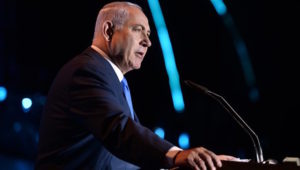
At a ‘closed-door’ meeting of his Likud party, PM Netanyahu reportedly tells attendees that ‘strength’ is all that matters in foreign policy, how no one worries about any so-called ‘occupation’ when genuine regional threats actually need to be addressed.
By Israel Today Staff
When Israel projects weakness, it invites the international community to make dangerous demands regarding the so-called “occupation” of Palestinian territories. Conversely, when Israel projects strength, the Palestinian issue is all but ignored in favor of more significant matters.
That was the gist of remarks reportedly made by Prime Minister Benjamin Netanyahu to a closed-door meeting of his Likud party on Monday.
RELATED:
- Israel’s Mossad alerts Danes of active Iranian assassination plot in Denmark
- White House Supports Plan to Link Mid-East Arab States & Israel by Rail
- ANALYSIS: Netanyahu’s gov’t takes Israel onto center stage of New Mid-East
“Power is the most important component of foreign policy. ‘Occupation’ is baloney. There were huge countries that have occupied and transferred populations and no one talks about them,” the prime minister was quoted as saying by Army Radio.
“Contrary to the notion that concessions will bring about agreements with the Arabs, concessions will only bring about slight and short-term changes and nothing more,” he added.
To bolster his argument, Netanyahu pointed to warming relations between Israel and many Arab states, while those same Arab states have stopped paying anything but lip service to the “Palestinian cause.”
There are believed to be two reasons for this.
First, Israel is for the first time joined by an American government in unequivocally rejecting those parts of the Palestinian narrative that reject the legitimacy of the Jewish state’s existence. That united front has quite possibly resulted in neighboring Arab states, which increasingly rely on US money and power, likewise spurning the very foundation of the Palestinian nationalist movement.

Israeli PM Netanyahu, Saudi Arabia’s future king, Prince Mohammed ben Salmane and Palestinian kleptocrat Abbas – Photos: Wikimedia
Second, while the Israel-Palestinian conflict was always presented as the primary threat to stability in the Middle East, the rise of ISIS and the Iranian nuclear threat have demonstrated that it, in the words of Saudi Arabia’s future king, is little more than a “side issue” compared to these genuine threats.
View original Israel Today publication at:
http://www.israeltoday.co.il/NewsItem/tabid/178/nid/35184/Default.aspx






 Israeli New Shekel Exchange Rate
Israeli New Shekel Exchange Rate